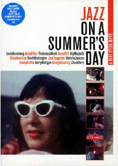 Before we run our John Frizzell interview, we've put up a candid chat at KQEK.com with Film Score Monthly's Lukas Kendall about the label's most ambitious project - Elmer Bernstein's 13-album series, the Film Music Collection.
Before we run our John Frizzell interview, we've put up a candid chat at KQEK.com with Film Score Monthly's Lukas Kendall about the label's most ambitious project - Elmer Bernstein's 13-album series, the Film Music Collection.Never heard of it?
Well, longtime platter collectors will probably have a few of the treasured albums that the late Oscar-winning composer produced from 1974-79, all out of his own pocket. Along with music from his peers & idols - namely Bernard Herrmann, Alfred Newman, Miklos Rozsa, Max Steiner, Dimitri Tiomkin, and Franz Waxman - Bernstein also re-recorded material from his own canon, and the albums were sold by mail order until a number of factors brought the ongoing project to a close.
The deluxe boxed set hasn't streeted yet, so read our piece to get some background info, and decided whether you're willing to work every Sunday and a few graveyard shifts for the next month to buy what's more than a standard collectable. The music's good, and it marks the composer's first major effort to preserve a chunk of film music history in his own inimitably modest way.
This will be the first of a few Bernstein pieces which will appear over the next few months, as I had the good fortune to interview him in 2000 about some specific albums and projects. (His jazz music was previously profiled in a two-issue spread in FSM, which is reproduced in complete form at http://www.elmerbernstein.com/news/filmscore_jazz.html.)
In the DVD department, we've also added new reviews for Allan Dwan's nutty 1957 'scope noir, The River's Edge, which is the strangest choice for Fox to include in their Studio Classics line (no Oscars or awards of any kind), but a pleasant surprise, since most TV prints were pretty beat up, and ruined the smooth 2.35:1 ratio.
We've also got our second installment in IHF's trio of fascist propaganda epics from WWII. This time it's Joseph Goebbels' infamous exercise in folly: Kolberg. Directed by the Reich's favoured helmer, Veit Harlan, Kolberg exploits the town's known stands against Napoleonic invaders as a not-too subtle rallying cry for 1940s Germans to fight the Allied forces - except the film barely premiered in a functional theatre while bombs and troops seethed deeper into Germany in 1945. It's a fascinating document that's worth a peek.
Lastly, from Polart comes another lost gem - Border Street/Ulica Graniczna - Aleksander Ford's amazingly frank and powerful social snapshot of the curbside racism that made it a little easier for the invading Nazi army to segregate Jews in the Warsaw Ghetto during WWII, and cart whole families off to the death camps.
Made in 1949 and banned by Polish Communist authorities for a while, the film uses some shocking language and images, and Ford's drama is an edifying film that's lost none of its power and importance.
In our next update we'll take a peek at IHF's The Fall of Berlin, and the usual mix of eclectic releases. We're also in the process of clearing out a lot of stuff from the personal archives, and some collectors of soundtracks and cult flicks might want to take a peek at out directory. To complete this shameful plug, look for the add banner at KQEK.com (or just go HERE), and help us buy more rare goodies so your morning coffee binge has more time to eat another frosty cruller.
Technorati Tags:








